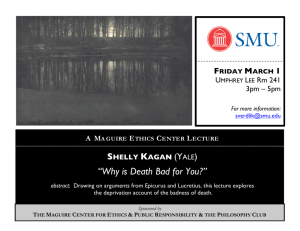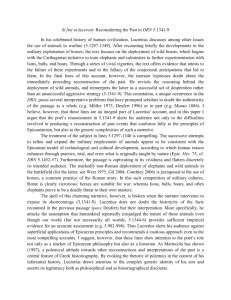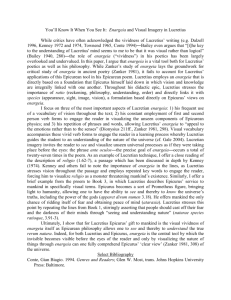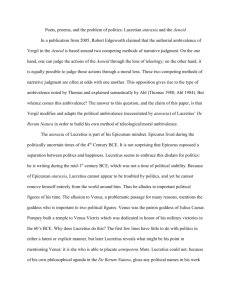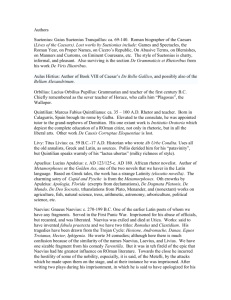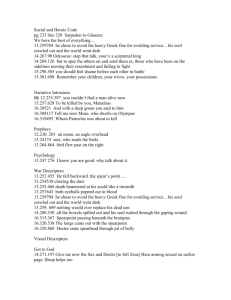FicLucretius - Harvard University
advertisement
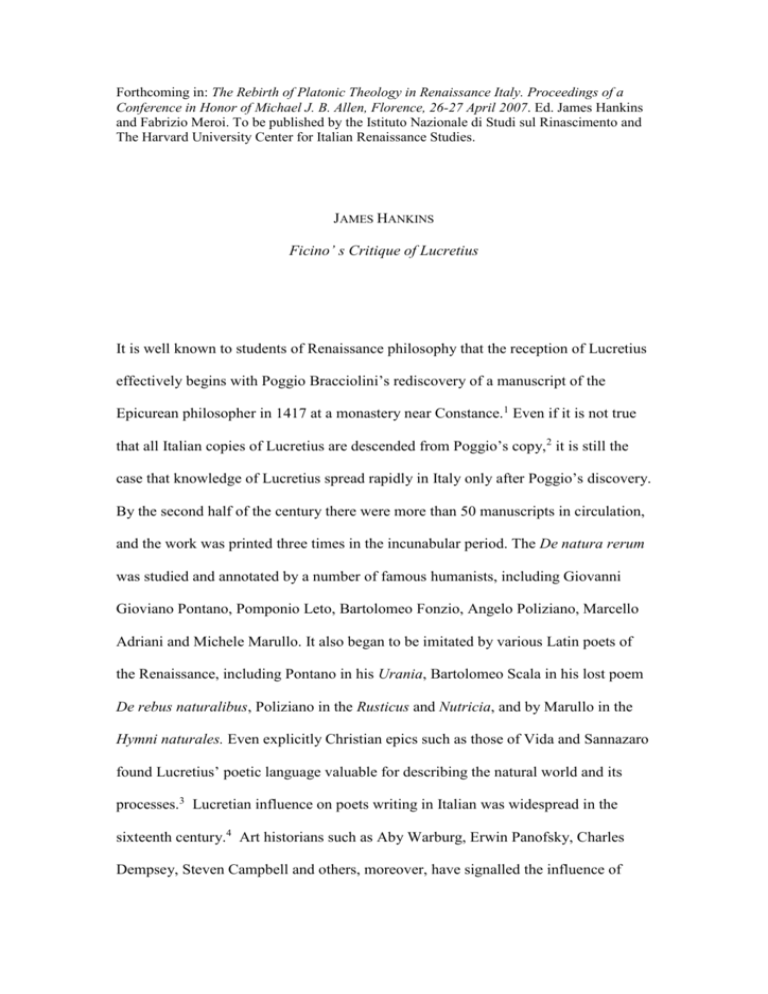
Forthcoming in: The Rebirth of Platonic Theology in Renaissance Italy. Proceedings of a Conference in Honor of Michael J. B. Allen, Florence, 26-27 April 2007. Ed. James Hankins and Fabrizio Meroi. To be published by the Istituto Nazionale di Studi sul Rinascimento and The Harvard University Center for Italian Renaissance Studies. JAMES HANKINS Ficino’ s Critique of Lucretius It is well known to students of Renaissance philosophy that the reception of Lucretius effectively begins with Poggio Bracciolini’s rediscovery of a manuscript of the Epicurean philosopher in 1417 at a monastery near Constance.1 Even if it is not true that all Italian copies of Lucretius are descended from Poggio’s copy,2 it is still the case that knowledge of Lucretius spread rapidly in Italy only after Poggio’s discovery. By the second half of the century there were more than 50 manuscripts in circulation, and the work was printed three times in the incunabular period. The De natura rerum was studied and annotated by a number of famous humanists, including Giovanni Gioviano Pontano, Pomponio Leto, Bartolomeo Fonzio, Angelo Poliziano, Marcello Adriani and Michele Marullo. It also began to be imitated by various Latin poets of the Renaissance, including Pontano in his Urania, Bartolomeo Scala in his lost poem De rebus naturalibus, Poliziano in the Rusticus and Nutricia, and by Marullo in the Hymni naturales. Even explicitly Christian epics such as those of Vida and Sannazaro found Lucretius’ poetic language valuable for describing the natural world and its processes.3 Lucretian influence on poets writing in Italian was widespread in the sixteenth century.4 Art historians such as Aby Warburg, Erwin Panofsky, Charles Dempsey, Steven Campbell and others, moreover, have signalled the influence of Lucretius on Renaissance art, including works by Botticelli, Piero di Cosimo, the sculptor Giovanni di Bertoldo (Michelangelo’s teacher), Leonardo da Vinci, Giorgione and Titian. Alison Brown has recently hypothesized that certain Lucretian themes were influential within a particular humanistic subculture in Florence during the late fifteenth and early sixteenth centuries, and has pointed to the presence of a Lucretian outlook in writers such as Bartolomeo Scala, Marcello Adriani, and Machiavelli.5 What is less well known is that the first philosopher of the Renaissance to have made a serious study of Lucretius was the Florentine Platonist, Marsilio Ficino, the leading figure in the Renaissance revival of Plato. Ficino began his engagement with Lucretius early, while he was still in his early twenties. Sometime in the late 1450s, he wrote what he later called a commentariola on Lucretius. This was remarkably precocious, given that the next commentary on Lucretius did not appear for more than half a century.6 Ficino’s commentary did not circulate and he later destroyed it, but what look like quotations or paraphrases from it crop up in two early works, the De voluptate and De quattuor sectis philosophorum.7 Ficino’s early studies of Lucretius are also documented in three letters of 1457.8 What these surviving documents show is that Ficino’s study of Lucretius went well beyond mere doxography. His reading of Lucretius was not undertaken merely to acquire a working knowledge of Epicurean doctrines. He read Diogenes Laertius that way, culling and summarizing doctrines of the various philosophers and schools treated therein.9 His response to Lucretius was different, more engaged. Ficino can be called in some sense a Lucretian and an Epicurean in this early period; he referred to the Roman thinker in a letter to his disciple Antonio Seraphico as Lucretius ille noster Epicureorum philosophorum clarissimus, and he used him as a true biou kubernetes, as a guide to life. Like Leonardo Bruni in the Isagogicon moralis philosophiae, Ficino treats the philosophy of the Epicureans in a positive way, distinguishing Epicurean tranquillitas from the gross sensuality of ‘the followers of Aristippus’, i.e., the Cyrenaics. He tries to find a way to assimilate the polytheistic theology of the Epicureans to Platonic and Christian monotheism. Despite the seeming naïveté of this syncretistic project, however, it is clear from the texts cited that Ficino has an excellent grasp of the Epicurean system, including the natural philosophy of books 1 and 2 of the De natura rerum. It must be said, however, that Ficino in this youthful period cannot be called an Epicurean in any exclusive or systematic sense. In the preface to the De voluptate of 1457 for example – the same text where he praises Epicurus – he explicitly calls himself a follower of Plato: Plato, quem tamquam philosophorum deum sequimur. In this period, Ficino seems to have believed that all the ancient philosophers had a certain value for persons who wished to live a philosophical life like the ancients. It is indeed this latter idea – that is was possible for Christians to live a philosophical life like the ancient pagans – that was the truly radical and potentially dangerous idea, not Ficino’s indiscriminate embrace of Epicureanism. However, sometime between 1457 and 1473, Ficino changed his mind about Epicurus. In the year 1473 Ficino wrote a letter to Poliziano in which he denied hotly that he had ever written certain letters Aristippicae et quadam ex parte Lucretianae that were circulating under his name.10 From the same year we have a short poem of Poliziano ad Bartolomeum Fontium, recently edited by Francesco Bausi, in which the poet describes his friend Ficino as a man dedicated to the refutation of Lucretius and Epicurus: Impia non sani turbat modo dicta Lucreti, Imminet erratis nunc, Epicure, tuis.11 Evidently something had happened between 1457 and 1473 – we don’t know exactly what – to make Ficino perceive Epicurean philosophy as a positive threat to his movement for the reform of Christian theology – a reform based on the recovery of the ancient Platonic tradition.12 By the late 1460s, if not earlier, this had become the fundamental goal of his life. As a result Ficino came to see the philosophy of Epicurus and his popularizer Lucretius as an enemy of the spiritual vision he hoped to nuture in Laurentian Florence. Perhaps too he wished to distance himself and his followers from the ‘impiety’ of the first Roman academy of Pomponio Leto, which had been accused of living una vita achademica et epicurea and had suffered persecution when the ‘Academic conspiracy’ was uncovered in 1468.13 In any case, by the time he composed the De christiana religione (1473-74), he had incorporated Epicurus into his reconstruction of the history of religion. Epicurus was now firmly yoked to the hedonist Aristippus as the main cause of the corruption of the GraecoRoman world before Christ; only the innumerable martyrs for Christ were able to provide a medicine to counteract their poison.14 The devaluation of Epicurean and Lucretian philosophy in the work of Ficino becomes manifest above all in his vast Platonic Theology, a work in eighteen books written between 1469 and 1474 and published in 1482. It is often said that the Theology is a kind of summa of Platonic philosophy, but this description really only applies well to the first four books. In fact, most of the work, particularly the last fourteen books, is directed to a specific purpose, which is to show beyond any possibility of doubt that the individual human soul is immortal. By so doing Ficino demonstrated that the ancient Platonic tradition could supply an armory of weapons to defend the teachings of the Christian religion on personal immortality as well as those on rewards and punishments in the afterlife. A subsidiary goal was to undermine the arguments of all philosophers who denied this conclusion. In this context, Epicurus, Lucretius, and the so-called Lucretiani became principle targets of Ficino’s criticism. If one attends to the structure and subject matter of the individual parts of the Platonic Theology, it quickly become evident that even Averroes, the explicit target of Book 15, ranks second as an enemy by comparision with the Epicureans, at least if one reckons by the relative amount of space Ficino devotes to refuting them.15 The Theology is divided, like Gaul, in partes tres. The first part provides a systematic treatment of the soul, in particular the animus, the rational soul. Ficino discusses the place of the soul in the cosmos and in the chain of being and its interactions with lower and higher essences. The higher essences include God and “angel” (i.e. the Plotinian nous), while the lower comprehend the world of enformed matter, space and motion. We then come to the second part, from the fifth to the fourteenth book, where Ficino advances a series of arguments to demonstrate the immortality of individual souls. In this part, Ficino addresses many times the arguments of Epicurus and Lucretius – in fact a sizeable proportion of these nine books is dedicated, implicitly and explicitly, to refuting Epicureans and Lucretians. In Book 6, chapter 2 for example there is found an argument against materialistic views of soul, above all those of Epicurus and Lucretius. Chapters 4 to 13 of that book try to demonstrate the indivisibility of the soul in the body, a proof implicitly directed against Lucretius’s arguments for the mortality of the soul in Book 3 of De natura rerum. Chapter 6 attacks explicitly the teaching of Epicurus and other ancient materialists that the soul is a fine-material body, arguing instead that the soul cannot be an entity knowable by the senses, even on the hypothesis that the senses were powerful enough to cognize the subtlest material bodies. Chapter 13 tries to show that the soul does not grow with the growth of the body as the Epicureans maintained. At the end of Book 14 (chapter 10), Ficino launches a broader attack on the Lucretiani for their conception of religion as a sickness and a perversion, born of superstitious fears about natural phenomena and the afterlife. Ficino advances a remarkable argument that in fact it is atheism that is abnormal and sick, and gives a medical etiology of atheism tracing it to the malign influence of melancholy and Saturn on the souls of intellectuals.16 The third and last part of the Theology, Books 15 to 18, is dedicated to the solution of five questions about the soul. After the enormous fifteenth book, dedicated entirely to a vehement attack on Ficino’s great bête-noire Averroes, Ficino returns to attack Epicureanism again in the sixteenth book, which carries the subtitle Quaestiones solvit Epicureorum. The first six chapters in essence answer the question raised in De natura rerum 3.800-805: Quippe etenim mortale aeterno iungere et una consentire putare et fungi mutua posse desiperest; quid enim diversius esse putandumst aut magis inter se disiunctum discrepitansque, quam mortale quod est inmortali atque perenni iunctum in concilio saevas tolerare procellas? (Indeed, to join mortal with immortal, and to think they can feel together and act upon the other is foolishness; for what can one imagine more different or more distinct from the other and discordant than a mortal thing joined with something immortal and deathless, weathering cruel storms in company?) The last two chapters ask, respectively, why souls are afflicted with tumultuous emotions if they are divine (16.7), and why rational souls are unwilling to depart from their bodies (16.8). These chapters seem to respond to the points made by Lucretius in De natura rerum 3.459-73 and 3.580-614, especially 612-614: quod si inmortalis nostra foret mens, non tam se moriens dissolvi conquereretur, sed magis ire foras vestemque relinquere, ut anguis. (But if our mind were immortal it would not complain so much in dying of its dissolution but would go out and leave behind its vestment like a snake.) To appreciate the full extent and vehemence of Ficino’s response to Lucretius, the reader will need to review Lucretius’s arguments against in immortality in Book 3 of the De natura rerum. Appendix I contains a detailed list of them, mostly drawing on Cyril Bailey’s commentary and a few other sources.17 Appendix II contains a list of Ficino’s arguments against Lucretius, keyed to the first appendix. Ficino’s arguments will not be analyzed here in great detail; I shall simply draw attention to some features of Lucretius’ principal arguments and Ficino’s responses to them. First, most of Lucretius’ arguments presuppose his demonstration, in Books 1 and 2 of De natura rerum, of the atomic and material composition of the soul. Second, Lucretius constantly tries to assimilate to each other the natural processes of soul and body and to show that they must belong to the same broad ontological classes. Thus he tries to show that both soul and body belong to the class of things divisible, changeable, extended in space, and individuated in matter; and that the functions of the soul take place in time. (These arguments are directed mainly against the Platonic-Pythagorean conception of soul that sees it as an immaterial substance which belongs ultimately to the timeless and motionless world of the Forms.) Furthermore, Lucretius tries to show that there is a sympatheia between soul and body, such that the body influences the soul and the soul is subject to material potencies – for example, in the case of sicknesses that impair one’s ability to think. He also tries to tie the functions of the soul to material processes, so as to show that the soul is not the kind of thing that could have form and life separately from the body. In general, Epicurus and Lucretius assume that thought is a species of sensation, and that therefore thought, like all forms of sensation, requires a bodily organ. Finally, Lucretius argues that the soul does not resemble things in nature generally acknowledged to be eternal: i.e., the universe itself, the void, atoms and gods. Ficino does not mount a systematic and sustained assault on Lucretius’ arguments in any one place but rather responds to Lucretius in various passages of the Theology. The reason for this scattershot approach, I believe, is that he did not want to disturb the overarching order of his own exposition in Books 6-14, which moves systematically from prime matter up to the angels and God. It should also be pointed out that Ficino does not use exclusively “Platonic” arguments to refute Lucretius, but borrows also from Aristotle, St Thomas Aquinas and other philosophers. For example, in Appendix II.3, Ficino’s response to Lucretius’s proof 2, Ficino invokes Aristotle’s analogy from the De anima 3.5 that the relationship of soul to body is that of an art to the instruments it uses. It is the instruments that wear out, says Aristotle, the hammer and chisel, not the art (or formal cause); this is said to undermine Lucretian arguments for the parallelism of soul and body. In Appendix II.1, Ficino follows Aquinas’ argument in the Summa contra gentiles to argue that God’s omniscience, including his knowledge of metaphysically inferior things, does not compromise the dignity of his essence, since he knows particulars only indirectly, through the ideas in the divine mind.18 Ficino follows several broad strategies in his efforts to refute Lucretius’ arguments. First, he stoops to a kind of ad hominem attack, labelling Lucretius as a vulgar and impious philosopher, reputedly a madman (13.2.5), who did not understand or value the spiritual nature of mankind. From Ficino’s Plotinian perspective, Lucretius and Epicurus were too focused on the sensual nature of man and the universe and neglected to turn inwards and upwards towards the true sources of reality within their own psyches (6.2, passim). The effort to reject Lucretius’ purely material and sensual vision of reality leads Ficino to devise what looks prima facie like Cartesian thought-experiment – though in fact it is adapted from Avicenna’s famous “flying man” argument – where he imagines a man created fully mature by God but without sense powers. Esse vero plebeiorum errorem a corporea consuetudine natum nosse incipiemus aliquantum, si saltem contrariam illius educationem aliquam cogitemus, qualem in sexto Naturalium excogitat Avicenna. Creetur a deo homo aliquis subito, inquit Avicenna, in aetate perfecta constitutus, sed ita dispositus, ut nihil per aliquem quinque sensuum apprehendat. Sic affecti hominis mens aliquid cogitabit, cum sit in aetate adulta, in qua corporis fabrica intellegentiam non perturbat, neque sit ad opera sensuum occupatus, quae mentis operationem impediunt, ac etiam adsit aliquid quod possit intellegi. Adest enim ipsa animae substantia menti. Mens igitur a nullo turbata praesentem sibi animae substantiam cogitabit. At qualem cogitabit? Num coloratam, longam aut amplam? Minime. Caecus enim similia non apprehendit. Num sonantem vel bene olentem atque similia? Neque ista quidem. Nondum enim talia quaedam per sensus accepit, ut possit talem naturam animae assignare. Igitur nihil poterit corporale anima illa sibi tribuere. Quid tandem de se ipsa asseverabit? Profecto id saltem, quod sibi primo offeretur intuitu. Est autem hoc ipsius essentia. Quapropter affirmabit esse se ipsam, neque tamen corporale quicquam in se ipsa perspiciet. Itaque affirmabit esse se prorsus incorporalem. Neque fingere quidem poterit esse se corpus, sicut plebis animae nunc aliter creatae atque educatae nequeunt se ipsas incorporales considerare. However, we shall begin to recognize somewhat the vulgar error born from habitual intercourse with the body if we at least suppose an education opposite to the body’s, such as that Avicenna devised in the sixth book of his Natural Problems.19 Imagine a man instantly created by God, Avicenna says, made fully mature but so disposed that he apprehends nothing through any of his five senses. Now the mind of a man in this condition will think about something since he is mature (meaning the body’s workshop does not interfere with understanding) and not consumed by the activities of the senses (which impede the operation of the mind); and since too there is something there which he can understand. For the soul’s substance itself is present to the mind. So with nothing to distract it, the mind will think about the substance of the soul which is present in it. But how will it think about the soul? As being of a particular color, length, or breadth? No! For a blind man does not perceive these. As melodious or fragrant or such like? Again no! For the mind has not yet received such qualities through the senses that it could ascribe a nature having them to the soul. So that soul will not be able to assign itself anything corporeal. So what then will it assert of itself? Certainly what is obvious at first sight at least. But that is its essence. So it will affirm that it exists, but it will not see anything corporeal in itself. So it will affirm that it is completely incorporeal. Nor will it be able even to imagine that it is body, just as the souls of the vulgar, created and brought up in different circumstances as they are, cannot think of themselves as incorporeal. In short, the essence of such a man’s soul would be present to his mind, but he would be unable to attribute sensual properties to his soul as he has no experience of them, not having senses. Such a creature will be unable to imagine that his soul is anything other than incorporeal, just as vulgar persons, immersed in the senses as they are, are unable to imagine that their soul is anything other than corporeal. Another version of this argument can be found in Appendix II.9, Ficino’s response to Proof 14 of Lucretius. Here Ficino tries to show that some mental operations do not have reference to things bodily, such as reflection on the existence and essence of the soul, “when it makes a judgment about what it is and the sort of thing it is that is said to operate without the body” (quando iudicat quid sit and quale idipsum, quod dicitur sine corpore operari). This is tantamount to a premodern version of the argument, commonly found in modern debates on the mind-body problem, that tries to infer the irreducability of mind to body from the mind’s consciousness of itself. Another broad strategy Ficino uses throughout the Theology to defend immortality against Lucretian materialism is to argue constantly for the necessity of a tertium quid, binding the world of the immaterial, eternal, immutable and universal to the world of matter, time, change, and particularity. The fact that soul has this double aspect explains for Ficino, among other things, why it is so often taken to be a material thing by persons without spiritual vision. In particular it explains for Ficino why the mind seems to respond to bodily states and medicine, a phenomenon which Lucretius had seen as a strong indication of the soul’s mortality (see Proof 7). Ficino maintains that the double role of the soul as the caretaker of the body and as a forager in the Plain of Truth forces it to toggle back and forth between the worlds of body and spirit. So in Appendix II.4-5, Ficino tries to show that the effects of sickness and injury on the mind do not prove that it is subject to material potencies and is therefore material, but rather that the soul has the power to focus its attention on the body when the body requires its unifying and vital force. When the body is well and its corporeal harmonies are restored, the soul becomes free to resume the search for truth. Yet a third anti-Lucretian strategy Ficino uses is to distinguish as much as possible from each other the processes and the metaphysical characteristics of soul and body. Thus, for example, he tries to show that some mental processes are instantaneous and not in time, showing that they belong to the hypostasis of reality metaphysically prior to the world of movement. So, in Appendix II.3, the response to Lucretius’ Proof 9, Ficino argues that when we learn something, the process of going from confusion to illumination often takes place instantaneously. Similarly, in the case of virtues, going from unstable continence to true possession of the virtue of temperance is an instantaneous process that emerges the moment a harmonious balance appears in the soul. If some mental processes are instantaneous and not continuous in time, Ficino concludes, rational soul, the seat of mental processes, must be a kind of res distinct from body, as somatic processes do take place in time. Finally, Ficino addresses a few of Lucretius’ aperçus which seem so strongly, on their face, to indicate the corporeal nature of the body. Lucretius had said that successful medical treatment brings back mental as well as physical powers, and this shows that both are linked in their corporeality. Ficino responds (Appendix II.7) that there are also examples of people whose minds, but not bodies, have been cured. This shows, for Ficino, that medicine can affect the mind in ways different from the ways it affects the body, showing that their essences are unlike. Again, Lucretius asks why – if (as the Platonists say) our true life is in the next life, life in separation from the body – people seem to depart this life so unwillingly. Ficino counters (Appendix II.8) by pointing out that babies cry loudly upon entering the world, as though realizing that their lives here in this earthly existence will be an exile. Both of Ficino’s arguments are skeptical in technique; he aims at equipollence of arguments in order to weaken materialistic convictions. To conclude, Ficino was the first Christian apologist to face seriously the challenge of ancient materialism in its most detailed and persuasive form: that represented by the De natura rerum of Lucretius. It is an interesting question to ask why, to judge from the amount of time he devoted to refuting him, Ficino evidently believed the threat posed to his Christian Platonism by Lucretius was even greater than the threat from Averroism and Alexandrism, which Ficino once famously described as dominating the world of Italian universities.20 Is this just compensation for Ficino’s own youthful flirtation with Lucretius and Epicureanism, or did Lucretius have a far deeper impact on fifteenth century thought than anyone has previously guessed? NOTES 1 Some key items in the large bibliography on the Renaissance reception of Lucretius in Italy are: C. A. GORDON, A Bibliography of Lucretius, London 1962; S. Bertelli, La conoscenza e la diffusione di Lucrezio nei codici umanistici italiani, Roma 1965; W. B. FLEISCHMANN, Lucretius Caro, Titus, in Catalogus Translationum et Commentariorum, ed. P. O. Kristeller and F. E. Cranz, vol. 2, Washington D.C. 1971, 349-365; E. FLORES, Le scoperte di Poggio e il testo di Lucrezio, Napoli 1980; U. PIZZANI, Angelo Poliziano e i primordi della filologia lucreziana, in Angelo Poliziano e il suo tempo, Atti del Congresso Internazionale, Chianciano – Montepulciano, 1821 luglio 1994, ed. L. Secchi Tarugi, Firenze 1996, pp. 343-55; G. SOLARO, Lucrezio: Biografie umanistiche, Bari 2000; G. BOCCUTO, Riprese Lucreziane nel Marullo e nel Poliziano, in Rapporti e scambi tra umanesimo italiano ed umanesimo europeo, ed. L. R. Secchi Tarugi, Milano 2001, pp. 705-16; A. PALMER, Reading Lucretius in the Renaissance, Ph.D. diss., Harvard University, 2009. 2 As is shown by M. D. REEVE, The Italian Tradition of Lucretius, «Italia medioevale e umanistica» XXIII, 1980, pp. 27-46. 3 See the indices to Marco Girolamo VIDA, The Christiad, tr. J. Gardner, Cambridge (Massachusetts) 2009 and Iacopo SANNAZARO, Latin Poetry, translated by M. C. J. Putnam, Cambridge (Massachusetts) 2009. 4 V. PROSPERI, Di soavi licor gli orli del vaso: La fortuna di Lucrezio dall’ Umanesimo alla Controriforma, Torino 2004. 5 A. M. BROWN, Lucretius and the Epicureans in the Social Context of Renaissance Florence, «I Tatti Studies» IX, 2001, pp. 11-62; EAD., Reinterpreting Renaissance Humanism: Marcello Adriani and the Recovery of Lucretius, in Interpretations of Renaissance Humanism, ed. A. Mazzocco, Leiden 2006, pp. 262-291; EAD., Machiavelli’s philosophy and religion, in The Cambridge Companion to Machiavelli, ed. J. Najemy, Cambridge, forthcoming. Brown’s book-length study, The Return of Lucretius to Renaissance Florence, will be published in 2010 by Harvard University Press (I Tatti Monographs in Italian Renaissance History, 2). 6 This was the commentary of Giovanni Battista PIO, published in Bologna in 1511, for which see FLEISCHMANN, Lucretius, 356-359. 7 Published respectively in Marsilio FICINO, Opera omnia, 2 voll., Basel 1576, reprint Turin 1983, I, pp. 987-1012 (hereafter Opera) and P. O. KRISTELLER, Supplementum Ficinianum, 2 vols., Firenze 1937, II, pp. 9-10 (hereafter SF). 8 SF II, 81-87. 9 See for example the doxography based on Diogenes Laertius he compiled in a manuscript (dated 1454) of Calcidius, for which see J. HANKINS, The Study of the Timaeus in Early Renaissance Italy, in Natural Particulars: Nature and the Disciplines in Renaissance Europe, ed. A. Grafton and N. Siraisi, Cambridge (Massachusetts) 1999, 77-119. Reprinted in ID, Humanism and Platonism in the Italian Renaissance, 2 voll., Roma 2003-2004, II, pp. 93-142, esp. pp. 135-136. 10 Marsilio FICINO, Lettere I: Epistolarum familiarium liber I, ed. S. Gentile, Firenze 1990, p. 39 (= Ep. I 15). 11 Angelo POLIZIANO, Ad Bartolomaeum Fontium: Due poemetti latini, ed. F. Bausi, Roma 2003, p. 30. (I owe this reference to Christopher Celenza.) 12 See most recently J. HANKINS, Marsilio Ficino and the Religion of the Philosophers, forthcoming in Rinascimento n.s. XLVIII (2008). 13 See J. HANKINS, Humanist Academies and the “Platonic Academy of Florence,” forthcoming in the proceedings of the conference, From the Roman Academy to the Danish Academy in Rome, ed. H. Ragn Jensen and M. Pade, to appear in Analecta Romana Instituti Danici Supplementum; on the transgressive character of the first Roman academy see also the article of Concetta BIANCA, Le accademie a Roma nel Quattrocento, in the same volume. 14 FICINO, Opera I, p. 55: ‘Graeci atque Romani paulo ante Christi lumen coeperant Aristippi Epicurique contagiosa impietate magis indies magisque corrumpi. Innumerabiles Christi exemplo martyres ubique Gentium, partim illiterati, partim literatissimi, cum praesentem vitam Dei unius futuraeque vitae gratia prorsus contemnerent, contra Aristippicum Epicureumque venenum medicinam hominibus saluberrimam porrexerunt.’ 15 For the structure of the work, see my ‘Outline of Ficino’s Platonic Theology’ in Marsilio Ficino, Platonic Theology, ed. and tr. M. J. B. Allen and J. Hankins et al., 6 voll., Cambridge (Massachusetts) 2001-2006, VI, pp. 319-326. All Latin quotations and English translations in this article are taken from this edition, and all citations of the Platonic Theology are from its book, chapter and paragraph numbers. 16 See J. HANKINS, ‘Malinconia mostruosa’: Ficino e le cause fisiologiche dell’ateismo, «Rinascimento» XLVII, 2007, pp. 3-23. 17 LUCRETIUS, De rerum natura libri six, ed. with prolegomena, critical apparatus, translation and commentary by Cyril Bailey, 3 voll., Oxford 1947. 18 See THOMAS AQUINAS, Summa contra Gentiles I, qu. 45. 19 AVICENNA, Liber de anima seu Sextus de Naturalibus, ed. S. van Riet, Leiden 1968, I, pp. 36-37. 20 FICINO, Opera, II, p. 537 (the preface to his translation of Plotinus).
